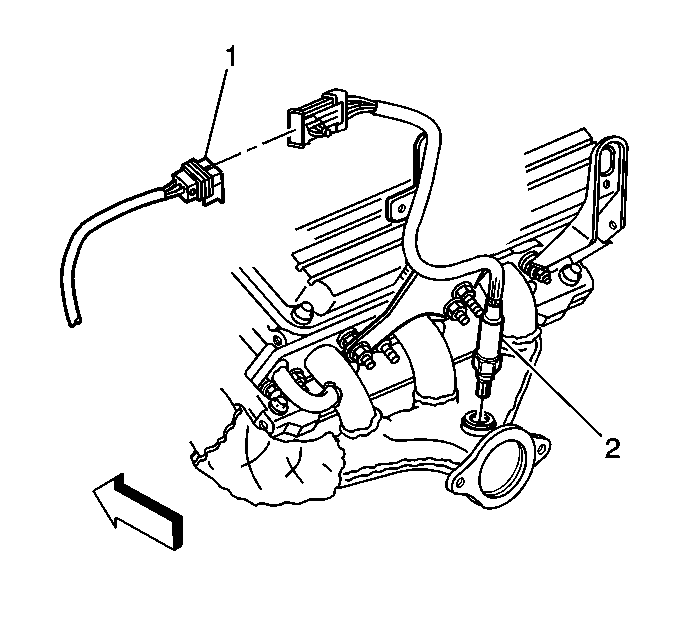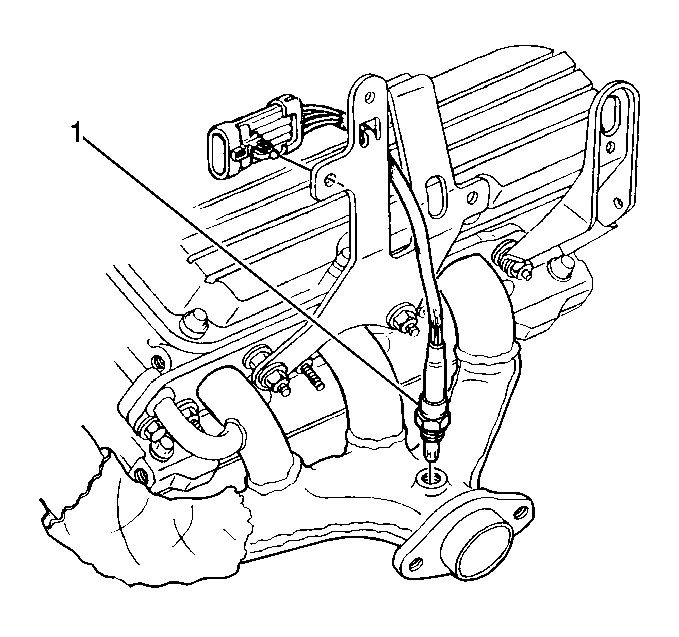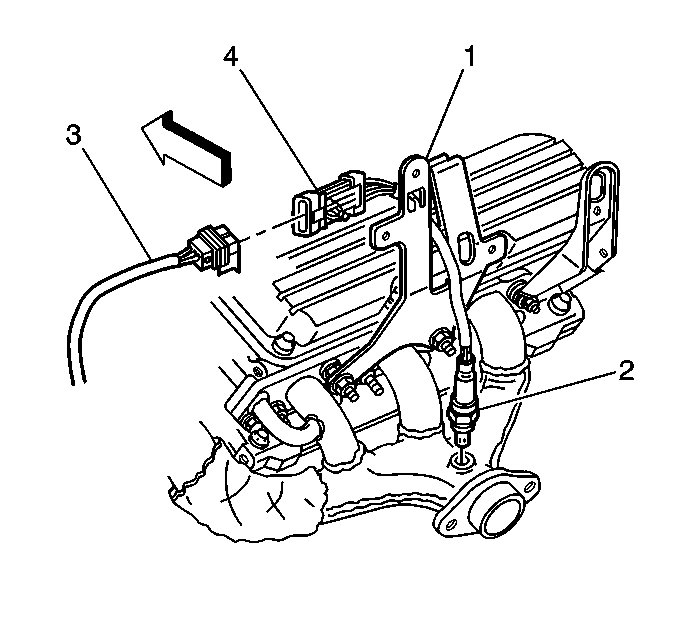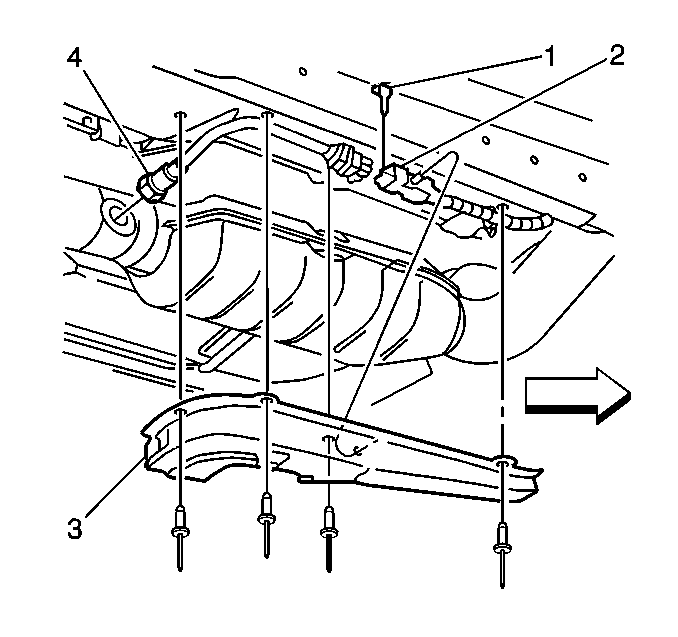Heated Oxygen Sensor Replacement HO2S1
Tools Required
J 39194 Oxygen Sensor Wrench
Notice: The Heated Oxygen Sensor (HO2S) and the Oxygen Sensor use a permanently attached pigtail and connector. Do not remove this pigtail from the Heated Oxygen Sensor. Damage or the removal of the pigtail or the connector could affect the proper operation of the sensor.
Take care when handling the HO2S and the O2S. Keep the in-line electrical connector and the louvered end free of grease, dirt, or other contaminants. Also avoid using cleaning solvents of any type. Do not drop the HO2S or the O2S. Do not roughly handle the HO2S or the O2S.Bank 1 Sensor 1 Removal Procedure
- Remove the fuel injection sight shield. Refer to Fuel Injector Sight Shield Replacement .
- Turn OFF the ignition switch.
- Remove the HO2S retaining clip from the bracket.
- Disconnect the HO2S electrical connector tab from the HO2S 1 retaining clip .
- Remove the HO2S electrical connector retainer.
- Raise and support the vehicle. Refer to Lifting and Jacking the Vehicle in General Information.
- Remove the rear oxygen sensor from the rear exhaust manifold carefully using the J 39194

Important: Remove oxygen sensors with the engine temperature above 48°C (120°F). Otherwise the oxygen sensors may be difficult to remove.
Bank 1 Sensor 1 Installation Procedure
- Install the rear oxygen sensor in the rear exhaust manifold.
- Lower the vehicle.
- Connect the electrical connector to the HO2S.
- Connect the HO2S electrical connector tab to the bracket.
- Install the HO2S electrical connector retainer.
- Install the fuel injection sight shield. Refer to Fuel Injector Sight Shield Replacement .

Notice: Use the correct fastener in the correct location. Replacement fasteners must be the correct part number for that application. Fasteners requiring replacement or fasteners requiring the use of thread locking compound or sealant are identified in the service procedure. Do not use paints, lubricants, or corrosion inhibitors on fasteners or fastener joint surfaces unless specified. These coatings affect fastener torque and joint clamping force and may damage the fastener. Use the correct tightening sequence and specifications when installing fasteners in order to avoid damage to parts and systems.
Important: A special anti-seize compound is used on the oxygen sensor threads. New service sensors should already have the compound applied to the threads. Coat the threads of a reused sensor with anti-seize compound P/N 5613695 or equivalent.
Tighten
Tighten the rear HO2S to 41 N·m (30 lb ft).

Heated Oxygen Sensor Replacement HO2S2
Tools Required
J 39194 Oxygen Sensor Wrench
Notice: The Heated Oxygen Sensor (HO2S) and the Oxygen Sensor use a permanently attached pigtail and connector. Do not remove this pigtail from the Heated Oxygen Sensor. Damage or the removal of the pigtail or the connector could affect the proper operation of the sensor.
Take care when handling the HO2S and the O2S. Keep the in-line electrical connector and the louvered end free of grease, dirt, or other contaminants. Also avoid using cleaning solvents of any type. Do not drop the HO2S or the O2S. Do not roughly handle the HO2S or the O2S.Bank 1 Sensor 2 Removal Procedure
Important: The heated oxygen sensor may be difficult to remove when engine temperature is less than 48°C (120°F). Excessive force may damage the threads in the exhaust manifold or the exhaust pipe.
- Turn OFF the ignition switch.
- Raise and support the vehicle. Refer to Lifting and Jacking the Vehicle in General Information.
- Remove the splash shield (3).
- Remove the HO2S electrical connector retaining tab (1) from the HO2S electrical connector (2).
- Disconnect the oxygen sensor connector from the HO2S electrical connector (2).
- Remove the oxygen sensor (4) from the exhaust pipe using the J 39194 .

Important: Remove oxygen sensors with the engine temperature above 48°C (120°F). Otherwise the oxygen sensors may be difficult to remove.
Bank 1 Sensor 2 Installation Procedure
- Install the oxygen sensor (4) into the exhaust pipe.
- Connect the HO2S (4) connector to the HO2S electrical connector (2).
- Reinstall the retaining tab (1) into the HO2S electrical connector.
- Install the front splash shield (3).
- Lower the vehicle.

Notice: Use the correct fastener in the correct location. Replacement fasteners must be the correct part number for that application. Fasteners requiring replacement or fasteners requiring the use of thread locking compound or sealant are identified in the service procedure. Do not use paints, lubricants, or corrosion inhibitors on fasteners or fastener joint surfaces unless specified. These coatings affect fastener torque and joint clamping force and may damage the fastener. Use the correct tightening sequence and specifications when installing fasteners in order to avoid damage to parts and systems.
Important: A special anti-seize compound is used on the oxygen sensor threads. New service sensors should already have the compound applied to the threads. Coat the threads of a reused sensor with anti-seize compound P/N 5613695 or equivalent.
Tighten
Tighten the oxygen sensor to 41 N·m (30 lb ft).
